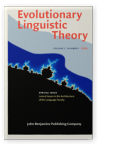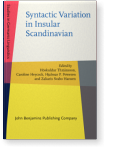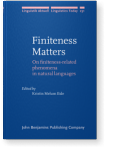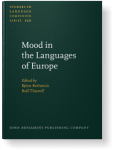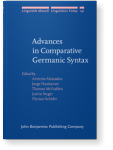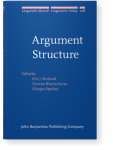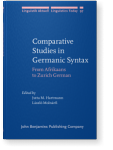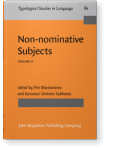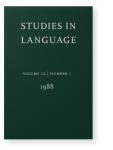Halldór Ármann Sigurðsson
List of John Benjamins publications for which Halldór Ármann Sigurðsson plays a role.
2020 Universality and variation in language: The fundamental issues Lexical Issues in the Architecture of the Language Faculty, Padovan, Andrea (ed.), pp. 5–29 | Article
This article discusses language universality and language variation, and suggests that there is no feature variation in initial syntax, featural variation arising by metamorphosis under transfer from syntax to PF-morphology. In particular, it explores the Zero Hypothesis, stating that Universal… read more
2017 Stylistic fronting in corpora Syntactic Variation in Insular Scandinavian, Thráinsson, Höskuldur, Caroline Heycock, Hjalmar P. Petersen and Zakaris Svabo Hansen (eds.), pp. 307–338 | Chapter
Stylistic Fronting (SF) fronts various types of non-subjects to preverbal position in subjectless clauses. With the exception of Icelandic and Faroese, SF has disappeared from Scandinavian. It is commonly assumed that even in Icelandic it is formal and old fashioned, indicating that it might be on… read more
2016 The Split T Analysis Finiteness Matters: On finiteness-related phenomena in natural languages, Eide, Kristin Melum (ed.), pp. 79–92 | Article
This essay pursues The Split T Analysis, claiming that finite clauses have three syntactically active T heads, roughly corresponding to the Reichenbachian S, R, E: Speech Tense, TS, in the C-domain, Referential Tense, TR (or simply T) in the T-domain, and Event Tense, TE, in the v-domain. This… read more
2011 Uniformity and diversity: A minimalist perspective Linguistic Variation 11:2, pp. 189–222 | Article
This essay discusses language uniformity and diversity in the light of recent developments of the minimalist program (Hauser et al. 2002; Chomsky 2008; Berwick & Chomsky 2011, and much related work). It pursues two leading ideas. First, Universal Grammar (UG) is maximally minimal: hence early… read more
2010 Mood in Icelandic Mood in the Languages of Europe, Rothstein, Björn and Rolf Thieroff (eds.), pp. 33–55 | Article
2010 The Empty Left Edge Condition Exploring Crash-Proof Grammars, Putnam, Michael T. (ed.), pp. 59–86 | Article
Argument drop is commonly subject to the Empty Left Edge Condition, ELEC, requiring that the left edge of the clause not be spelled out. ELEC can be explained in terms of minimality, as an intervention effect (blocking context-linking of the null-argument). We argue that sensitivity to this effect… read more
2009 The No Case Generalization Advances in Comparative Germanic Syntax, Alexiadou, Artemis, Jorge Hankamer, Thomas McFadden, Justin Nuger and Florian Schäfer (eds.), pp. 249–280 | Article
This paper argues that syntax has no case features, case instead being an interpretative feature or features operative in the PF morphology of individual languages, where it overtly distinguishes between arguments (or NPs). The paper also argues that the non-syntactic nature of case is to be… read more
2007 Argument features, clausal structure and the computation Argument Structure, Reuland, Eric J., Tanmoy Bhattacharya and Giorgos Spathas (eds.), pp. 121–158 | Article
This paper claims that case is vP-internally interpretable and that high NP-movement is driven by (minimally) two other ‘forces’: Person checking in a position higher than Tense, and EPP (Fin) checking in a still higher position, ‘Spec,IP’. This is evidenced by ‘low’ nominatives, quirky agreement,… read more
2006 The Nom/Acc alternation in Germanic Comparative Studies in Germanic Syntax: From Afrikaans to Zurich German, Hartmann, Jutta M. and László Molnárfi (eds.), pp. 13–50 | Article
2006 Agree in syntax, agreement in signs Agreement Systems, Boeckx, Cedric (ed.), pp. 201–237 | Article
2004 7. Icelandic non-nominative subjects Non-nominative Subjects: Volume 2, Bhaskararao, Peri and Karumuri V. Subbarao (eds.), pp. 137–160 | Chapter
2004 Meaningful silence, meaningless sounds Linguistic Variation Yearbook 2004, Pica, Pierre (ed.), pp. 235–259 | Article
This paper discusses the very general question of how syntactic features of individual languages relate to the universal set of syntactic features. It is pointed out that Chomsky’s approach (2001a) to this fundamental issue is paradoxical. On one hand he argues that language is uniform in the… read more
1988 Review of Hellan & Christensen (1986): Topics in Scandinavian syntax Studies in Language 12:1, pp. 209–223 | Review
